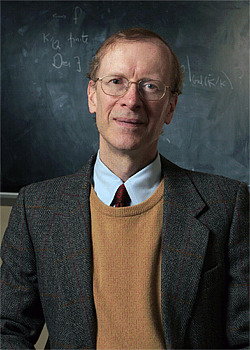Mathematician Andrew Wiles Appointed to the Board of the Institute for Advanced Study

The Institute for Advanced Study has appointed Dr. Andrew J. Wiles, Eugene Higgins Professor of Mathematics and Chair of the Department of Mathematics at Princeton University, to its Board of Trustees, effective May 5, 2007. A world-renowned mathematician, Dr. Wiles is perhaps best known for his proof of Fermat's Last Theorem, for which he was honored by the International Mathematical Union in 1998.
At the May 2007 Board meeting, the Institute also accepted the resignation of two Trustees whose terms had ended - Dr. James Arthur, who has served as Academic Trustee for the School of Mathematics since 1997, and Dr. Ronaldo Schmitz, who joined the Board in 1992. Dr. Schmitz was elected Trustee Emeritus effective May 5, 2007.
The British-born Dr. Wiles earned his undergraduate degree at Merton College, Oxford, in 1974, and obtained his Ph.D. at Clare College, Cambridge, in 1980. He was a Member in the School of Mathematics at the Institute three times, in 1981-82, 1991-92, and 1995-2004, and will serve as the Academic Trustee for the School.
Prior to his 1982 appointment to the faculty at Princeton University, Dr. Wiles was a Junior Research fellow at Clare College and a Benjamin Pierce Assistant Professor at Harvard University. After being awarded a Guggenheim fellowship, he spent a year at the Institut des Hautes Études Scientifique and the École Normale Supérieure, Paris, in 1985-86. He also spent two years at Oxford University as a Royal Society Research Professor beginning in 1988.
Dr. Wiles, whose research concerns number theory, has received numerous awards during his career, including the Wolf Prize (1995-96); the National Academy of Science Award in Mathematics (1996); the Royal Medal of the Royal Society of London (1996); the Frank Nelson Cole Prize in Number Theory from the American Mathematical Society (1997), and the Shaw Prize in Mathematical Sciences (2005). He was named a Fellow of the Royal Society in 1989, and was elected a foreign member of the National Academy of Sciences in 1996 and the French Academy of Sciences in 1998, and in 2001 was named a London Mathematical Society Honorary Member.
Dr. James Arthur, one of the world's foremost researchers in automorphic forms and Lie group representations, has been a frequent Member in the School through the years, beginning in 1976-77 and most recently in 2000-02. As an Academic Trustee, Dr. Arthur has been an extraordinarily effective advocate on behalf of the School of Mathematics as well as mathematics in the academic world and in society as a whole.
During his 15 years of service on the Board, Dr. Ronaldo Schmitz has been instrumental in promoting the international character and high standing of the Institute and has acted as a strong supporter of the Institute's role in the advancement of cutting-edge research. A former member of the Board of Managing Directors of Deutsche Bank AG, Dr. Schmitz played a vital role in establishing the Institute's Albert O. Hirschman Chair in Economics to commemorate the achievements of Professor Hirschman, who has served on the Faculty of the School of Social Science since 1974, becoming Professor Emeritus in 1985.
About the Institute for Advanced Study
The Institute for Advanced Study is one of the world’s leading centers for theoretical research and intellectual inquiry. The Institute exists to encourage and support curiosity-driven research in the sciences and humanities—the original, often speculative thinking that produces advances in knowledge that change the way we understand the world. Work at the Institute takes place in four Schools: Historical Studies, Mathematics, Natural Sciences and Social Science. It provides for the mentoring of scholars by a permanent Faculty of approximately 30, and it ensures the freedom to undertake research that will make significant contributions in any of the broad range of fields in the sciences and humanities studied at the Institute.
The Institute, founded in 1930, is a private, independent academic institution located in Princeton, New Jersey. Its more than 6,000 former Members hold positions of intellectual and scientific leadership throughout the academic world. Thirty-three Nobel Laureates and 40 out of 56 Fields Medalists, as well as many winners of the Wolf and MacArthur prizes, have been affiliated with the Institute.